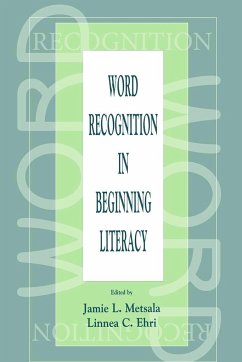Word Recognition in Beginning Literacy
Herausgeber: Metsala, Jamie L.; Ehri, Linnea C.
Word Recognition in Beginning Literacy
Herausgeber: Metsala, Jamie L.; Ehri, Linnea C.
- Broschiertes Buch
- Merkliste
- Auf die Merkliste
- Bewerten Bewerten
- Teilen
- Produkt teilen
- Produkterinnerung
- Produkterinnerung
This volume brings together reading and literacy experts from education and psychology in an examination of issues impacting early reading success and failure. For students and researchers in literacy and educators alike.
Andere Kunden interessierten sich auch für
![Concept Development in the Primary School Concept Development in the Primary School]() Peter LangfordConcept Development in the Primary School35,99 €
Peter LangfordConcept Development in the Primary School35,99 €![Pattern Theory Pattern Theory]() Mumford, David, QC (Brown University, Providence, Rhode Island, USA)Pattern Theory112,99 €
Mumford, David, QC (Brown University, Providence, Rhode Island, USA)Pattern Theory112,99 €![Storytelling for Interactive Digital Media and Video Games Storytelling for Interactive Digital Media and Video Games]() Nicholas B. ZemanStorytelling for Interactive Digital Media and Video Games74,99 €
Nicholas B. ZemanStorytelling for Interactive Digital Media and Video Games74,99 €![Conducting Reaction Time Research in Second Language Studies Conducting Reaction Time Research in Second Language Studies]() Nan Jiang (USA University of Maryland)Conducting Reaction Time Research in Second Language Studies63,99 €
Nan Jiang (USA University of Maryland)Conducting Reaction Time Research in Second Language Studies63,99 €![Reading in a Second Language Reading in a Second Language]() A.H. UrquhartReading in a Second Language54,99 €
A.H. UrquhartReading in a Second Language54,99 €![Teaching and Researching Reading Teaching and Researching Reading]() William GrabeTeaching and Researching Reading44,99 €
William GrabeTeaching and Researching Reading44,99 €![Recognition and Ambivalence Recognition and Ambivalence]() Heikki IkäheimoRecognition and Ambivalence34,99 €
Heikki IkäheimoRecognition and Ambivalence34,99 €-
-
-
This volume brings together reading and literacy experts from education and psychology in an examination of issues impacting early reading success and failure. For students and researchers in literacy and educators alike.
Produktdetails
- Produktdetails
- Verlag: Taylor & Francis Inc
- Seitenzahl: 414
- Erscheinungstermin: 1. April 1998
- Englisch
- Abmessung: 229mm x 152mm x 22mm
- Gewicht: 658g
- ISBN-13: 9780805828993
- ISBN-10: 0805828990
- Artikelnr.: 27307854
- Herstellerkennzeichnung
- Libri GmbH
- Europaallee 1
- 36244 Bad Hersfeld
- gpsr@libri.de
- Verlag: Taylor & Francis Inc
- Seitenzahl: 414
- Erscheinungstermin: 1. April 1998
- Englisch
- Abmessung: 229mm x 152mm x 22mm
- Gewicht: 658g
- ISBN-13: 9780805828993
- ISBN-10: 0805828990
- Artikelnr.: 27307854
- Herstellerkennzeichnung
- Libri GmbH
- Europaallee 1
- 36244 Bad Hersfeld
- gpsr@libri.de
Jamie L. Metsala, Linnea C. Ehri
Contents: Preface. Part I: Basic Processes in Beginning Word Recognition. L.C. Ehri
Grapheme-Phoneme Knowledge Is Essential for Learning to Read Words in English. U. Goswami
The Role of Analogies in the Development of Word Recognition. S.A. Stahl
B. Murray
Issues Involved in Defining Phonological Awareness and Its Relation to Early Reading. J.L. Metsala
A.C. Walley
Spoken Vocabulary Growth and the Segmental Restructuring of Lexical Representations: Precursors to Phonemic Awareness and Early Reading Ability. G.D.A. Brown
The Endpoint of Skilled Word Recognition: The ROAR Model. Part II: Processes and Instruction for Disabled Readers.L.S. Siegel
Phonological Processing Deficits and Reading Disabilities. J.K. Torgesen
S.R. Burgess
Consistency of Reading-Related Phonological Processes Throughout Early Childhood: Evidence From Longitudinal-Correlational and Instructional Studies. B.W. Wise
R.K. Olson
J. Ring
M. Johnson
Interactive Computer Support for Improving Phonological Skills. I.W. Gaskins
A Beginning Literacy Program for At-Risk and Delayed Readers. Part III: Word Recognition in Context.A.E. Cunningham
K.E. Stanovich
The Impact of Print Exposure on Word Recognition. L. Baker
S. Fernandez-Fein
D. Scher
H. Williams
Home Experiences Related to the Development of Word Recognition. R. Treiman
Why Spelling? The Benefits of Incorporating Spelling Into Beginning Reading Instruction. R. Calfee
Phonics and Phonemes: Learning to Decode and Spell in a Literature-Based Program. D.H. Tracey
L.M. Morrow
Motivating Contexts for Young Children's Literacy Development: Implications for Word Recognition. M. Pressley
R. Wharton-McDonald
J. Mistretta
Effective Beginning Literacy Instruction: Dialectial
Scaffolded
and Contextualized.
Grapheme-Phoneme Knowledge Is Essential for Learning to Read Words in English. U. Goswami
The Role of Analogies in the Development of Word Recognition. S.A. Stahl
B. Murray
Issues Involved in Defining Phonological Awareness and Its Relation to Early Reading. J.L. Metsala
A.C. Walley
Spoken Vocabulary Growth and the Segmental Restructuring of Lexical Representations: Precursors to Phonemic Awareness and Early Reading Ability. G.D.A. Brown
The Endpoint of Skilled Word Recognition: The ROAR Model. Part II: Processes and Instruction for Disabled Readers.L.S. Siegel
Phonological Processing Deficits and Reading Disabilities. J.K. Torgesen
S.R. Burgess
Consistency of Reading-Related Phonological Processes Throughout Early Childhood: Evidence From Longitudinal-Correlational and Instructional Studies. B.W. Wise
R.K. Olson
J. Ring
M. Johnson
Interactive Computer Support for Improving Phonological Skills. I.W. Gaskins
A Beginning Literacy Program for At-Risk and Delayed Readers. Part III: Word Recognition in Context.A.E. Cunningham
K.E. Stanovich
The Impact of Print Exposure on Word Recognition. L. Baker
S. Fernandez-Fein
D. Scher
H. Williams
Home Experiences Related to the Development of Word Recognition. R. Treiman
Why Spelling? The Benefits of Incorporating Spelling Into Beginning Reading Instruction. R. Calfee
Phonics and Phonemes: Learning to Decode and Spell in a Literature-Based Program. D.H. Tracey
L.M. Morrow
Motivating Contexts for Young Children's Literacy Development: Implications for Word Recognition. M. Pressley
R. Wharton-McDonald
J. Mistretta
Effective Beginning Literacy Instruction: Dialectial
Scaffolded
and Contextualized.
Contents: Preface. Part I: Basic Processes in Beginning Word Recognition. L.C. Ehri
Grapheme-Phoneme Knowledge Is Essential for Learning to Read Words in English. U. Goswami
The Role of Analogies in the Development of Word Recognition. S.A. Stahl
B. Murray
Issues Involved in Defining Phonological Awareness and Its Relation to Early Reading. J.L. Metsala
A.C. Walley
Spoken Vocabulary Growth and the Segmental Restructuring of Lexical Representations: Precursors to Phonemic Awareness and Early Reading Ability. G.D.A. Brown
The Endpoint of Skilled Word Recognition: The ROAR Model. Part II: Processes and Instruction for Disabled Readers.L.S. Siegel
Phonological Processing Deficits and Reading Disabilities. J.K. Torgesen
S.R. Burgess
Consistency of Reading-Related Phonological Processes Throughout Early Childhood: Evidence From Longitudinal-Correlational and Instructional Studies. B.W. Wise
R.K. Olson
J. Ring
M. Johnson
Interactive Computer Support for Improving Phonological Skills. I.W. Gaskins
A Beginning Literacy Program for At-Risk and Delayed Readers. Part III: Word Recognition in Context.A.E. Cunningham
K.E. Stanovich
The Impact of Print Exposure on Word Recognition. L. Baker
S. Fernandez-Fein
D. Scher
H. Williams
Home Experiences Related to the Development of Word Recognition. R. Treiman
Why Spelling? The Benefits of Incorporating Spelling Into Beginning Reading Instruction. R. Calfee
Phonics and Phonemes: Learning to Decode and Spell in a Literature-Based Program. D.H. Tracey
L.M. Morrow
Motivating Contexts for Young Children's Literacy Development: Implications for Word Recognition. M. Pressley
R. Wharton-McDonald
J. Mistretta
Effective Beginning Literacy Instruction: Dialectial
Scaffolded
and Contextualized.
Grapheme-Phoneme Knowledge Is Essential for Learning to Read Words in English. U. Goswami
The Role of Analogies in the Development of Word Recognition. S.A. Stahl
B. Murray
Issues Involved in Defining Phonological Awareness and Its Relation to Early Reading. J.L. Metsala
A.C. Walley
Spoken Vocabulary Growth and the Segmental Restructuring of Lexical Representations: Precursors to Phonemic Awareness and Early Reading Ability. G.D.A. Brown
The Endpoint of Skilled Word Recognition: The ROAR Model. Part II: Processes and Instruction for Disabled Readers.L.S. Siegel
Phonological Processing Deficits and Reading Disabilities. J.K. Torgesen
S.R. Burgess
Consistency of Reading-Related Phonological Processes Throughout Early Childhood: Evidence From Longitudinal-Correlational and Instructional Studies. B.W. Wise
R.K. Olson
J. Ring
M. Johnson
Interactive Computer Support for Improving Phonological Skills. I.W. Gaskins
A Beginning Literacy Program for At-Risk and Delayed Readers. Part III: Word Recognition in Context.A.E. Cunningham
K.E. Stanovich
The Impact of Print Exposure on Word Recognition. L. Baker
S. Fernandez-Fein
D. Scher
H. Williams
Home Experiences Related to the Development of Word Recognition. R. Treiman
Why Spelling? The Benefits of Incorporating Spelling Into Beginning Reading Instruction. R. Calfee
Phonics and Phonemes: Learning to Decode and Spell in a Literature-Based Program. D.H. Tracey
L.M. Morrow
Motivating Contexts for Young Children's Literacy Development: Implications for Word Recognition. M. Pressley
R. Wharton-McDonald
J. Mistretta
Effective Beginning Literacy Instruction: Dialectial
Scaffolded
and Contextualized.









